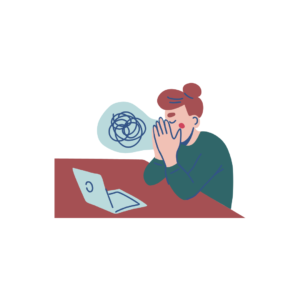Depression in ADHD loved ones can be challenging to understand for neurotypical people. In ADHD women, the increased vulnerability to depression stems from a complex interplay of societal expectations, stigma, and the unique challenges posed by ADHD itself. Let's break down these factors to understand why women with ADHD may face higher rates of depression. Then, we can talk about how supportive partners and family members can offer meaningful help.
Societal Expectations and Unrealistic Standards
Women are often held to high standards across all aspects of life. This "gold standard" is not only unrealistic but also particularly crushing for women with ADHD, who struggle with executive function challenges that make these expectations even more difficult to meet.
The constant feeling of falling short, judgment, and criticism they receive can significantly erode self-esteem and contribute to depressive symptoms.
Stigma and Misunderstanding
ADHD in women is frequently misunderstood, leading to damaging stereotypes and prejudices. Being labeled as "lazy" or "irresponsible" from a young age can have a profound impact on a woman's self-image and contribute to feelings of worthlessness and depression.
The Exhaustion of Masking
Many women with ADHD feel pressured to hide their symptoms to conform to societal norms. This "masking" requires a tremendous amount of mental and emotional energy, leading to burnout, feelings of isolation, and depression as they struggle internally to keep up appearances while feeling unsupported.
Chronic Stress from Unmet Needs
The continuous effort to meet societal and personal expectations can cause chronic stress. For women with ADHD, this stress is compounded by ADHD-related challenges and often leads to physical and mental health issues. This makes them prone to depression and eventually something unique called neurodivergent burnout.
Hormonal Influences
Women with ADHD are also more susceptible to hormonal fluctuations that affect mood. Estrogen, which regulates dopamine—a neurotransmitter involved in attention and mood—can exacerbate mood disorders such as PMDD, PMS, and depression during puberty, their monthly cycle, the postpartum period, and perimenopause. But most professionals don't recognize this and haven't been supported or informed.
How to Support Women with ADHD and Depression
-
-
Embrace and Accept Her ADHD: Foster a supportive atmosphere by creating a family environment that understands and accepts her ADHD challenges as a different neurotype, not a defect. This understanding is vital, especially when considering the intersection of ADHD with depression in loved ones, emphasizing the need for acceptance and support.
-
Educate Yourself on Neurodivergent Strengths: Recognize and celebrate her unique strengths like creativity and hyperfocus, while also understanding challenges like time blindness without shaming. Education about ADHD and its co-occurrence with depression in loved ones helps in appreciating the complex experiences of women navigating both conditions.
-
Listen Without Judgment: Offer empathetic listening, reflect on what you hear, and acknowledge her emotions without rushing to offer solutions. This is particularly important in supporting loved ones with depression and ADHD, as it provides them with a safe space to express themselves and feel understood.
-
Offer Practical Support: Recognize the toll of chronic stress and offer hands-on support to alleviate daily pressures. Understand dealing with depression in ADHD loved ones means knowing they might struggle to ask for help. Just make things as easy as possible for them.
-
Encourage Authentic Expression (Unmasking): Support her in being her true self, providing a safe space to express herself without fear of judgment. This unmasking is crucial for her mental health and healing process, especially for those navigating the complexities of depression in ADHD loved ones. Encouraging authentic expression helps address the internalized stigma and promote emotional well-being.
Depression in ADHD Loved Ones: The Intersection of ADHD, Motivation, and the Nervous System
ADHD impacts more than just attention and impulsivity; it profoundly influences motivation and how the nervous system engages with the world. Unlike neurotypical brains, which can often push through tasks regardless of interest, the ADHD nervous system is fundamentally interest-based.
Supporting Neurodivergent Motivation and Well-Being
-
Acknowledge the Interest-Based Nervous System: Engagement comes easier when tasks are aligned with their interests or passions.
-
Create a Supportive Environment for Passion Projects. This not only boosts motivation but can also powerfully counterbalance depressive symptoms.
-
Minimize Criticism and Maximize Encouragement: Focus on strengths and progress, celebrating her successes and understanding her unique challenges.
-
Learn Together About ADHD-Compatible Strategies: Explore and implement strategies that work with, not against, her ADHD, such as using visual aids or incorporating movement into tasks to maintain engagement.
By understanding the unique pressures and challenges faced by women with ADHD, partners and family members can offer meaningful support that addresses both the symptoms of ADHD and depression. This supportive approach not only helps in managing depression but also empowers women with ADHD to embrace their neurodiversity as a source of strength and resilience.

